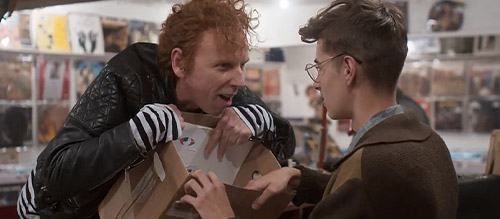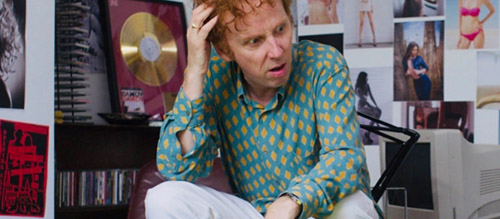Creation Stories (2021) Review – GFF
Creation Stories (2021)
Director: Nick Moran
Screenwriters: Dean Cavanagh, Irvine Welsh
Starring: Ewen Bremner, Leo Flanagan, Suki Waterhouse, Jason Isaacs, Mel Raido, Thomas Turgoose, Michael Socha, Ed Byrne, Paul Kaye, Perry Benson, Steven Berkoff, Rufus Jones
Creation Stories follows the life of Alan McGee, the Glaswegian born entrepreneur and founder of Creation Records. McGee, best known in the music industry for managing and discovering such bands as Jesus and The Mary Chain, Primal Scream, My Bloody Valentine and the mighty Oasis, has lived one heck of a life, so it’s an abysmal shame that his biopic has turned out to be such an egotistical mess. Although penned by the legendary Irvine Welsh (author of “Trainspotting” and “Filth”), produced by Danny Boyle (127 Hours, Slumdog Millionaire, Trainspotting) and directed by Nick Moran (The Kid), McGee’s transparent influence over their work lingers like a bad smell throughout the entire film. The music industry icon’s off-screen vanity hijacks each story beat, leaving us with a sanitised, self-serving and insincere version of events.
Creation Stories plays out as an exhibition of snapshots from McGee’s life, which we see as he regales his tale to a young journalist (Suki Waterhouse). The journalist’s name is Gemma – not that her character matters in any way; as one of the few women in the film, her entire role is to sit and listen passively to McGee while he rhapsodies about his career highs and lows. We start in Glasgow, where a cheeky, young David Bowie obsessive dreams of a life in the music industry – much to the disappointment of his Dad, who slaps him around and steals his hard-earned cash. Teenage McGee (Leo Flanagan) watches on in complete awe as the Sex Pistols destroy the established rules of modern music, and, inspired by their anarchy, he starts a band with his pals and moves to London to chase his dreams. Once there, Flanagan evolves into Ewen Bremner (the fifty-year-old actor best known for his work in Trainspotting, Wonder Woman, and Pearl Harbour), who, despite his hideous, ill-fitting orange wig and trendy leather pants, doesn’t quite disappear into the role of McGee in his twenties.
The rest of the Creation Records team rock up as flamboyant caricatures played by Mel Raido (in the most noticeable bald cap you’ve ever seen), and This Is England’s Thomas Turgoose and Michael Socha (also sporting school play quality wigs). Together, the team odyssey through the history of British music, picking up bands and fresh artists across punk, new wave, acid house and rave, before making big moves in the world of Britpop. McGee – who has also picked up some pretty severe drug-habits – navigates the world with erratic energy, clashing with executives and hustling his way out of his many debts in order to maintain his image as a self-made man. Creation eventually signs with Sony, which solidifies McGee’s name as an industry elite. However, the film makes it plain that this move was no ‘sell-out’. Moran quashes the very notion that Creation gave up its integrity for money by showcasing McGee as a king in a castle of his own creation.
The rest of the story follows McGee’s downfall. There’s a brief layover in the narrative to address his drug addiction, recovery and subsequent agoraphobia, but these issues seem trivialised beyond recognition, fixed just as quickly as Moran bothers to introduce them. An obscure night out in Los Angeles with Jason Issacs serves as McGee’s rock bottom: he awakens in a crack den, leaves, then trips out in his hotel room in a sequence that horrifically fails to mimic Trainspotting’s gritty, psychedelic magic. There’s also another suspiciously one-sided journey into McGee’s stint in the ‘New Labour’ party, which the film paints as an elaborate hoodwinking that McGee was powerless to resist. The most diabolical part of this picture comes when McGee attends a dinner party hosted by Tony and Cherie Blair, only to be interrupted by the infamous paedophile Jimmy Savile. Afterwards, once McGee has finished dining with Savile, the film has the nerve to suggest that McGee knew all about the cigar chomper’s notorious crimes and that he didn’t care for any further association with the monster – if this were true Alan, perhaps it would have been decent of you to have mentioned it at the time.
McGee’s pivotal career moment comes just after his mother’s death when he misses the train home to London and ends up on a night out with his sister. A rowdy gang of ‘scally Mancunians’ – as they are so affectionately referred to – change the very course of McGee’s life, finally fulfilling his life-long dream to manage a band ‘bigger than U2’. Oasis were one of the most dominating forces to ever emerge on the Britpop scene, yet here they are played as paper-thin cartoon characters with terrible Manc accents – we can only hope Liam and Noel Gallagher never see this film. ‘Do you know what I mean? Anyway, as you were, Alan,’ Liam says to McGee before strutting away in his tracksuit and matching bucket hat.
There’s not a soul in the world who could discredit Ewen Bremner when it comes to playing a screw-loose, fast-talking smackhead: his work as Spud in Danny Boyle’s Trainspotting is some of the most revolutionary acting ever committed to film. However, if you’ve done something once, why do it again? His performance as McGee is almost insufferable. Moran’s decision to switch out Leo Flanagan for Bremner in the early scenes of McGee’s life is a ludicrous move: he’s laughably too old for the part. However, the most grating part of Bremner’s performance is his needleless commitment to shouting every single one of his lines. He talks in an intertwining succession of annoyingly loud psychobabble, and it’s just impossible to care about whatever thing he’s prattling on about to the poor, non-character journalist who just has to sit there and take it. High profile British actors and comedians such as Ed Byrne, Paul Kaye, Perry Benson, Jason Isaacs, Steven Berkoff and Rufus Jones filter in and out of the proceedings in an attempt to add some much-needed spice, but the payoff of their presence isn’t enough to carry the movie. If anything, the slew of cameos distracts from the narrative further (you spend more time trying to figure out where you recognise each famous face from than you do actually watching the film).
Admittedly, there are some funny moments, and the soundtrack of legendary British music is a welcome distraction from the chaos happening on screen. However, overall, Creation Stories misses the mark by a long shot. It’s a messy, mildly offensive exercise in arrogance that isn’t brave enough to make one honest statement. If you’re craving for an Oasis fix, perhaps try Supersonic instead?
3/24



